名词性从句讲义
名词性从句讲义 完整版!

名词性从句一,名词性从句的概念:1, 相当于名词,分为主语从句、表语从句、宾语从句和同位语从句2,名词性从句的引导词:that, whether, if (一般是宾语从句),as if(表语从句),who, whom, whose, what, which, when, where, why, how,以及由how组成的词组,如:how many, how long, how far两组需要注意的连接词that/what1)that和what都可以引导名词性从句,但that是连接词,本身无词义,仅起连接作用,不在从句中担任任何成份;what是连接代词,不仅引导名词性从句,而且在从句中充当一定的成份,如主语、宾语或表语。
e.g: That he stole a bike was true.The important thing is what you do, but not what you say.高考真题:_______ we can't get seems better than _______ we have.A. What; whatB. What; thatC. That; thatD. That; what2)whether和if均可引导动词后的宾语从句,常可互换。
a.在介词后面只能用whether,不能用if。
例如:①This depends upon whether we are determined to do it.b.在动词不定式之前,只能用whether,不能用if。
例如:①He doesn't know whether to stay or not.c.引导主语从句,表语从句,同位语从句时只能用whether。
例如:①It is unknown whether he will come. 他是否来还不知道。
②The question is whether they can take our advice.3.The question whether he'll come is unknown.3)doubt用于肯定结构时,后面用whether/ if引导名词性从句;用于否定结构或疑问结构时,后面用that引导名词性从句。
名词性从句-完整版PPT课件精选全文

3. 连接副词:when(=the time when什么时候,何时),where(=the place where什么地方,何地),how(=the way that/in which怎样, 以……方式,如何),why=the reason why为什么)。它们除起连 接作用,还在从句中作状语。
3) wh类连接词引导的主语从句: wh类连接词包括wh类的连接代词(who, whom,
whose, which, what, whoever, whomever, whichever, whatever等)和连接副词(when,
where, how, why, whenever, wherever, however 等)。what, when和wh-ever类的词有时可不表 疑问。wh类连接代词在句中既起连接作用, 又可充当主语、宾语、表语、定语等成分。 wh类连接副词在句中起连接作用,在从句中 可充当时间、地点、原因、方式状语。
【温馨提示】 ①whether/ if引导宾语从句表示“是否”
的意思时,一般情况下可互换。 ②if引导宾语从句时可以有否定式,而
whether从句则没有。 e.g. I don’t care if he doesn’t come.
5) 特殊疑问词引导的宾语从句: 由who, what, how, which, whose, where, why等词引导的宾语从句,可作动词、 介词及形容词的宾语。
【温馨提示】 doubt, doubtful与sure后名词性从句连接词 that, whether, if的选择。 ①当doubt, doubtful用于肯定句时,后面的名
词性从句的连接词常用whether或if;当 doubt, doubtful用于否定句或疑问句时,后 面名词性从句的连接词用that。
名词性从句讲义教案

名词性从句讲义教案一、教学目标1. 让学生理解名词性从句的概念和作用。
2. 让学生掌握不同类型的名词性从句(如主语从句、宾语从句、表语从句和同位语从句)的构成和用法。
3. 培养学生运用名词性从句进行有效沟通和表达的能力。
二、教学内容1. 名词性从句的定义和分类2. 主语从句的构成和用法3. 宾语从句的构成和用法4. 表语从句的构成和用法5. 同位语从句的构成和用法三、教学方法1. 采用案例分析法,通过实际例句讲解名词性从句的构成和用法。
2. 采用互动教学法,让学生参与讨论和练习,提高运用名词性从句的能力。
3. 采用任务驱动法,设计相关练习和任务,让学生在实际操作中巩固知识。
四、教学步骤1. 引入名词性从句的概念,让学生初步了解其定义和作用。
2. 通过例句讲解主语从句的构成和用法,让学生进行模仿练习。
3. 通过例句讲解宾语从句的构成和用法,让学生进行模仿练习。
4. 通过例句讲解表语从句的构成和用法,让学生进行模仿练习。
5. 通过例句讲解同位语从句的构成和用法,让学生进行模仿练习。
五、课后作业1. 总结名词性从句的构成和用法,写一篇短文进行阐述。
2. 设计一个包含名词性从句的对话或短文,与同学互相交流。
3. 收集相关资料,深入了解名词性从句在实际语境中的应用。
教学评价:1. 课后作业的完成情况,观察学生对名词性从句的掌握程度。
2. 在下一节课中,让学生运用所学知识进行口语表达,检验其运用能力。
3. 通过课堂提问和练习,了解学生在学习过程中遇到的困难和问题,及时进行反馈和指导。
六、教学案例分析1. 案例一:主语从句句子:What he sd surprised us all.分析:该句中,主语从句"What he sd" 作为整个句子的主语,回答了"谁的话让我们惊讶" 的问题。
2. 案例二:宾语从句句子:I don't know where he is.分析:该句中,宾语从句"where he is" 作为动词"know" 的宾语,回答了"我不知道的地方" 的问题。
名词性从句语法讲解课件

that在主语从句中不充当任何成分, 仅起连接作用;what、who、which 等引导词则需要在主语从句中充当相 应的成分。
主语从句的句型结构
主语从句的句型结构通常为“引导词+主语+谓语”,其中引导词是主语从句的开头, 主语是句子中的主要内容,谓语则用来表达主语的动作或状态。
例如:“What he said is not important.”(他所说的是不重要的。)这个句子中, “What he said”就是主语从句,“is”是谓语,“not important”是表语。
03 表语从句
表语从句的定义
表语从句是名词性从句的一种, 用作句子的表语成分,表示主 语的性质、状态或身份等。
表语从句的时态和主句时态保持一致,如果主句时态是现在时,则表语 从句时态也应该是现在时。如果主句时态是过去时,则表语从句时态也 应该是过去时。
04 宾语从句
宾语从句的定义
宾语从句是句子在复 合句中充当宾语成分 的句子。
宾语从句在句子中充 当宾语,对主句起到 补充说明的作用。
宾语从句可以由疑问 代词、疑问副词、陈 述代词或陈述副词引 导。
名词性从句的作用
01
02
03
表达意义
名词性从句能够完整地表 达一个概念或信息,使复 合句意义更加丰富。
补充说明
名词性从句可以用来补充 说明主句中的某个名词或 代词,提供更多细节。
强调重点
名词性从句可以用来强调 某个概念或信息的重要性, 突出主题。
名词性从句的引导词
陈述句引导词
01
that、what、which、who/whom等。
名词性从句讲义

名词性从句讲义一. 名词性从句在句子中起名词性作用的从句叫做名词性从句(Noun Clauses). 名词性从句在句中的作用相当于名词或名词短语, 在复合句中担当主语, 宾语, 表语和同位语等. 因此根据它在句中不同的语法功能可分为: 主语从句, 宾语从句, 表语从句和同位语从句.引导名词性从句的连接词可分为三种:连接词: that, whether, if (不在从句中做任何成分)连接代词: what, who, whom, which, whose和wh+ever (通常在从句中做主语,宾语,表语等) 连接副词: when, where, why, how以及wh/h+ever(通常在从句中做状语)二.主语从句1.概念: 主语从句是在复合句中充当主语的从句.2.连接词:that只起连接主句和从句的作用,在从句中不担任任何成分,本身没有词义,不可省略whether 连接主句和从句, 在从句中不担任任何成分, 但本身有选择或是否的含义whether与if 区别(一)引导宾语从句,一般既可用whether 也可用if。
但1 or not放在whether之后时,只能用whether 不用if。
I don’t know whether or not he will come. 我不知道他是不是回来。
注1:如果or not放在whether所引导的从句句尾,则可以用if来替换。
I don’t know whether/if he will come or not.我不知道他是不是回来。
2 在强调任意选择时,用whether…or,此时不用if替换whether。
He asked me whether I wanted to go there by train or by bus.他问我是想乘火车还是坐公共汽车去那里。
注:whether和or一起还有“不管”之意,引导让步状语从句。
Whether he drives or takes the train, he will be here on time.不管开车来还是乘火车来,他都会准时到。
高中名词性从句讲义
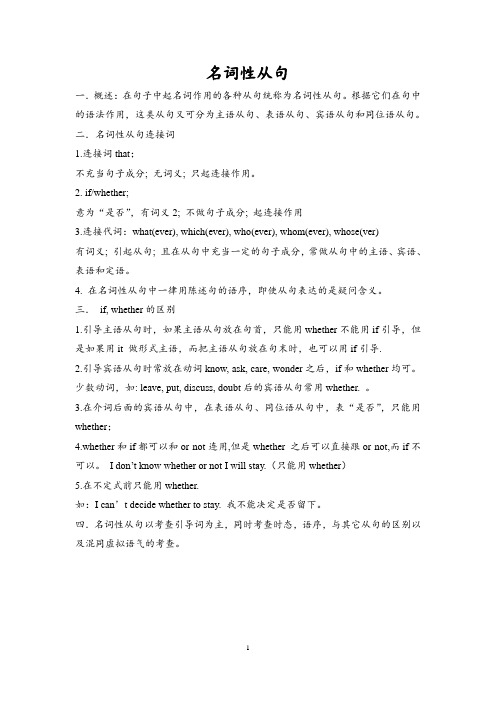
名词性从句一.概述:在句子中起名词作用的各种从句统称为名词性从句。
根据它们在句中的语法作用,这类从句又可分为主语从句、表语从句、宾语从句和同位语从句。
二.名词性从句连接词1.连接词that;不充当句子成分; 无词义; 只起连接作用。
2. if/whether;意为“是否”,有词义2; 不做句子成分; 起连接作用3.连接代词:what(ever), which(ever), who(ever), whom(ever), whose(ver)有词义; 引起从句; 且在从句中充当一定的句子成分,常做从句中的主语、宾语、表语和定语。
4. 在名词性从句中一律用陈述句的语序,即使从句表达的是疑问含义。
三.if, whether的区别1.引导主语从句时,如果主语从句放在句首,只能用whether不能用if引导,但是如果用it 做形式主语,而把主语从句放在句末时,也可以用if引导.2.引导宾语从句时常放在动词know, ask, care, wonder之后,if和whether均可。
少数动词,如: leave, put, discuss, doubt后的宾语从句常用whether. 。
3.在介词后面的宾语从句中,在表语从句、同位语从句中,表“是否”,只能用whether;4.whether和if都可以和or not连用,但是whether 之后可以直接跟or not,而if不可以。
I don’t know whether or not I will stay.(只能用whether)5.在不定式前只能用whether.如:I can’t decide whether to stay. 我不能决定是否留下。
四.名词性从句以考查引导词为主,同时考查时态,语序,与其它从句的区别以及混同虚拟语气的考查。
一.主语从句1.主语从句定义:在复合句中充当主语的句子叫做主语从句。
That he will succeed is certain.Whether wild life can be well protected is of great importance.Who will go makes no different.Which kind of food is the best is still not certain.What is needed for the space trip is careful preparation.Whoever comes is welcome.How we can help the twins will be discussed at the meeting.When they’ll start the project has not been decided yet.Where he hid the money is to be found out.Why dinosaurs died out remains a puzzle.单个主语从句作主语时,谓语动词用单数形式。
名词性从句讲义教案
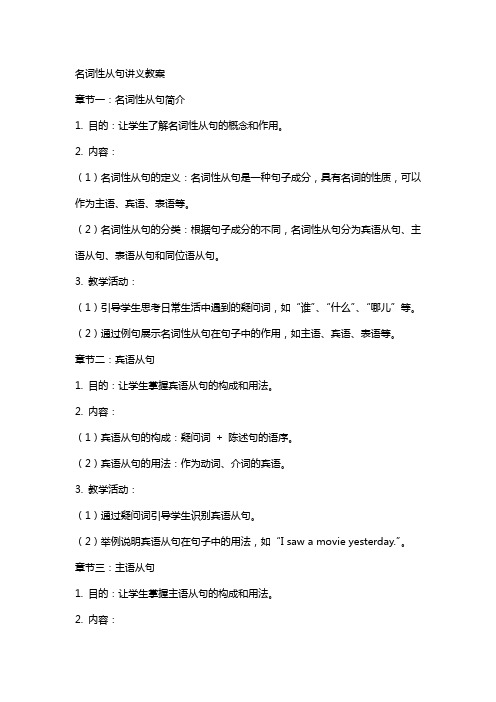
名词性从句讲义教案章节一:名词性从句简介1. 目的:让学生了解名词性从句的概念和作用。
2. 内容:(1)名词性从句的定义:名词性从句是一种句子成分,具有名词的性质,可以作为主语、宾语、表语等。
(2)名词性从句的分类:根据句子成分的不同,名词性从句分为宾语从句、主语从句、表语从句和同位语从句。
3. 教学活动:(1)引导学生思考日常生活中遇到的疑问词,如“谁”、“什么”、“哪儿”等。
(2)通过例句展示名词性从句在句子中的作用,如主语、宾语、表语等。
章节二:宾语从句1. 目的:让学生掌握宾语从句的构成和用法。
2. 内容:(1)宾语从句的构成:疑问词+ 陈述句的语序。
(2)宾语从句的用法:作为动词、介词的宾语。
3. 教学活动:(1)通过疑问词引导学生识别宾语从句。
(2)举例说明宾语从句在句子中的用法,如“I saw a movie yesterday.”。
章节三:主语从句1. 目的:让学生掌握主语从句的构成和用法。
2. 内容:(1)主语从句的构成:疑问词+ 陈述句的语序。
(2)主语从句的用法:作为主语,表示话题或陈述对象。
3. 教学活动:(1)通过疑问词引导学生识别主语从句。
(2)举例说明主语从句在句子中的用法,如“That she is ing is good news.”。
章节四:表语从句1. 目的:让学生掌握表语从句的构成和用法。
2. 内容:(1)表语从句的构成:疑问词+ 陈述句的语序。
(2)表语从句的用法:作为表语,补充说明主语的内容。
3. 教学活动:(1)通过疑问词引导学生识别表语从句。
(2)举例说明表语从句在句子中的用法,如“The problem is that we don't have enough time.”。
章节五:同位语从句1. 目的:让学生掌握同位语从句的构成和用法。
2. 内容:(1)同位语从句的构成:疑问词+ 陈述句的语序。
(2)同位语从句的用法:与前面的名词或代词共同作主语、宾语或表语,起到解释说明的作用。
名词性从句讲义

教学内容名词性从句1. 名词性从句种类及作用2. 引导词的种类及作用种类作用例句主语从句 相当于名词,在复合句中做主句的主语(其位置一般在谓语动词之前,但多数情况用it 做形式主语,而把主语从句放在主句之后,)That the earth goes around the sun is known to all.(= It is known to allthat the earth goes round the sun.)地球绕太阳转是众所周知的。
When and where he was born is a secret.他生于何时何地是个谜。
It is certain that she will do well in her exam.可以肯定她会考得很好。
表语从句 相当于名词,在复合句中做主句的表语,位于主句的系动词之后。
That is why I didn't come yesterday. 那就是我昨天没来的原因。
The question is whether he will come or not. 问题是他是否来不来。
宾语从句 相当于名词,在复合句中做主语的宾语。
He asked me whom I was waiting for. 他问我在等谁。
Could you tell me if Mr. Li lives here? 你能告诉我李先生是否住在这?同位语从句一般跟在某些抽象名词后(如news, promise, idea, suggestion, fact, problem, advice, thought, truth, belief, message, hope, order 等),用以说明其具体内容。
The news that our football team won the match was encouraging. 我们球队赢得了比赛的消息令人鼓舞。
(不缺任何成分) You have no idea how worried she was! 你不知道她是多么担忧啊!主语从句 宾语从句表语从句 同位语从句 作及物动词宾语 作介词宾语 连接词 that 一般不省略 可以省略 一般不省略一般不省略一般不省略 whether/if (是否) 放在句首时只用whether用whether/if 均可,但有区别只用whether 只用whether只用wether连接代词 who, whose, what, which, whatever, whoever 注意语序要用陈述语序 连接副词how, when, where, why, wherever 注意语序要用陈述语序3.使用名词性从句应注意事项4. 同位语从句与定语从句的区别.1.(2011,22) Barbara Jones offers to her fans is honesty and happiness. A. Which B.What C.That D.Whom2. (2010, 31) I want to be liked and loved for I am inside. A. who B. where C.what D.how3.(2010,33) some people regard as a drawback is seen as a plus by many others. A.Whether B.What C.That D.How注意事项病句分析(1)所使用的名词性从句,应是主、谓成分完整的句子,且从句不能用逗号和主句分开。
高中英语名词性从句讲义(超详细版)
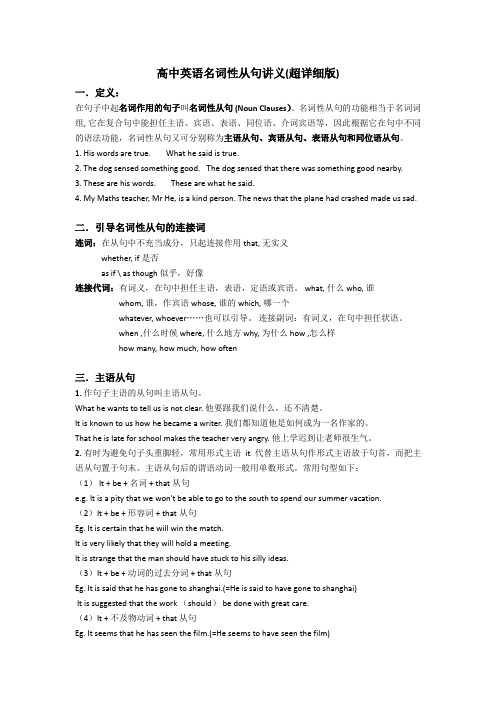
高中英语名词性从句讲义(超详细版)一.定义:在句子中起名词作用的句子叫名词性从句 (Noun Clauses)。
名词性从句的功能相当于名词词组, 它在复合句中能担任主语、宾语、表语、同位语、介词宾语等,因此根据它在句中不同的语法功能,名词性从句又可分别称为主语从句、宾语从句、表语从句和同位语从句。
1. His words are true. What he said is true.2. The dog sensed something good. The dog sensed that there was something good nearby.3. These are his words. These are what he said.4. My Maths teacher, Mr He, is a kind person. The news that the plane had crashed made us sad.二.引导名词性从句的连接词连词:在从句中不充当成分,只起连接作用 that, 无实义whether, if 是否as if \ as though 似乎,好像连接代词:有词义,在句中担任主语,表语,定语或宾语。
what, 什么 who, 谁whom, 谁,作宾语 whose, 谁的 which, 哪一个whatever, whoever……也可以引导。
连接副词:有词义,在句中担任状语。
when ,什么时候 where, 什么地方 why, 为什么 how ,怎么样how many, how much, how often三.主语从句1. 作句子主语的从句叫主语从句。
What he wants to tell us is not clear. 他要跟我们说什么,还不清楚。
It is known to us how he became a writer. 我们都知道他是如何成为一名作家的。
名词性从句讲解课件

02 功能
用于引导主语从句、宾语从句、表语从句和同位 语从句。
03 例子
The news that he passed the exam was unexpected.(他通过考试的消息是出人意料 的。)
whether的用法
01
02
03
定义
whether用作引导词,在 名词性从句中充当成分, 表示“是否”。
功能
用于引导主语从句、宾语 从句、表语从句和同位语 从句。
例子
I don't know whether he will come or not. (我不知道他是否会来。)
who/whom/whose的用法
定义
who/whom/whose用作 引导词,在名词性从句中 充当成分,表示“谁”。
as引导的让步状语从句
总结词
表示转折关系
详细描述
as可以引导让步状语从句,表示“尽管、虽然”的意思。这种从句通常出现在主句之前,用于 强调从句中的内容。
than引导的比较状语从句
总结词
表示比较关系
详细描述
than可以引导比较状语从句,表示“比...更...”的意思。这种从句通常出现在主 句之后,用于强调两者之间的差异或优劣。
被动语态
表示主语是动作的接受者。例如:“It was said that the book would be published next year.”
时态与语态的结合使用
现在进行时的被动语态
表示正在被进行的动作或存在的状态。例如: “We are being told that the game is about to start.”
《名词性从句完整》课件

由连词引导的主语从句
连词+主语+谓语。例如:That he will come is certain.
由关系代词引导的主语从句
主语+谓语+关系代词+宾语。例如:What he said is true.
由关系副词引导的主语从句
主语+谓语+关系副词+宾语。例如:When he will come is unknown.
03
表语从句
表语从句的定义
表语从句
在复合句中,用作表语的从句, 放在系动词之后。
作用
补充说明主语或主句所表示的状 态、特征、身份等。
表语从句的引导词
01
02
03
04
that:无实际意义,仅 起连接作用。
whether:表示“是否 ”。
as if:表示“似乎、好 像”。
because:表示“原因 ”。
同位语从句的引导词
常用的同位语从句引导词是that,有 时也用what和how。
当同位语从句表示具体内容时,通常 用what引导;当同位语从句表示方式 或方法时,通常用how引导。
同位语从句的句型结构
同位语从句通常紧跟在引导词后面, 用逗号与前面的名词或代词隔开。
同位语从句的时态要与主句时态保持 一致,根据实际情况选择合适的时态 。
示例
What he said is not true. (宾语从 句)
名词性从句的分类
01
02
03
04
主语从句
在句子中充当主语的名词性从 句。
宾语从句
在句子中充当宾语的名词性从 句。
表语从句
在句子中充当表语的名词性从 句。
名词性从句〓讲义〓

1名词性从句:一个句子在句中起了名词充当的成分,作主语、宾语、表语、同位语。
充当什么句子成分,该句子就叫什么从句。
(1)宾语从句在复合句中用作动词宾语或介词宾语的从句叫宾语从句。
A. 作动词宾语He told us(that)he felt ill. 他对我们说他感到不舒服。
Do you know whose dictionary it is? 你知道这是谁的字典?He has informed me when they are to discuss the work plan. 他已经通知我他们将什么时候讨论工作计划Give a reading list to whoever comes. 给所有来的人一份阅读书目。
注意:doubt(怀疑)的肯定句接if/whether引导的宾语从句,但否定句和疑问句接that 引导的宾语从句。
I doubt whether if he will succeed. 我怀疑他是否会成功。
I do not doubt that he can recite the poem. 我相信他能把这首诗背下来。
Do you doubt that he will win 你不相信会获胜吗B.作介词的宾语He was deeply displeased by what had occurred/happened that day. 他对那天发生的事感到很不快。
I am curious as to what he will say. 我很想知道他要说什么。
Your success will largely depend on/upon what you do and how you do it. 你是否成功将主要取决于你做什么和怎样做。
They were praised or criticized according to how they had done their work. 他们受表扬还是受批评是根据他们工作好坏而定。
名词性从句讲义 完整版!

名词性从句一,名词性从句的概念:1, 相当于名词,分为主语从句、表语从句、宾语从句和同位语从句2,名词性从句的引导词:that, whether, if (一般是宾语从句),as if(表语从句),who, whom, whose, what, which, when, where, why, how,以及由how组成的词组,如:how many, how long, how far两组需要注意的连接词that/what1)that和what都可以引导名词性从句,但that是连接词,本身无词义,仅起连接作用,不在从句中担任任何成份;what是连接代词,不仅引导名词性从句,而且在从句中充当一定的成份,如主语、宾语或表语。
e.g: That he stole a bike was true.The important thing is what you do, but not what you say.高考真题:_______ we can't get seems better than _______ we have.A. What; whatB. What; thatC. That; thatD. That; what2)whether和if均可引导动词后的宾语从句,常可互换。
a.在介词后面只能用whether,不能用if。
例如:①This depends upon whether we are determined to do it.b.在动词不定式之前,只能用whether,不能用if。
例如:①He doesn't know whether to stay or not.c.引导主语从句,表语从句,同位语从句时只能用whether。
例如:①It is unknown whether he will come. 他是否来还不知道。
②The question is whether they can take our advice.3.The question whether he'll come is unknown.3)doubt用于肯定结构时,后面用whether/ if引导名词性从句;用于否定结构或疑问结构时,后面用that引导名词性从句。
名词性从句讲解课件

特点
which在从句中担任成分 ,通常表示“哪个”、“ 哪些”。
例子
I don't know which book you like best. (我 用法
定义
例子
whose是一个限定词,用于引导名词 性从句,表示某个对象的所属关系。
I don't know whose book this is. ( 我不知道这是谁的书。)
分类
01
02
03
04
主语从句
在句子中充当主语的名词性从 句,通常放在句子的开头。
宾语从句
在句子中充当宾语的名词性从 句,通常放在动词或介词之后
。
表语从句
在句子中充当表语的名词性从 句,通常放在系动词之后。
同位语从句
在句子中充当同位语的名词性 从句,通常放在名词之后,对
名词进行补充说明。
02 名词性从句的引导词
总结词
在名词性从句中,从句与主句的逻辑关系经常处理不当。
详细描述
应仔细分析从句与主句之间的逻辑关系,确保从句的内容与 主句的内容相符合,避免出现逻辑上的矛盾或混乱。
感谢您的观看
THANKS
定义
why是一个副词,用于引导名词性从句,表示某 个原因或动机。
特点
why在从句中担任成分,通常表示“为什么”、 “因为什么”。
3
例子
I don't know why he left early. (我不知道他为 什么提前离开了。)
03 名词性从句的时态和语态
时态:现在时、过去时、将来时
现在时
表示现在或将来某个时间点发生的动作或存在的 状态。
强调句型
总结词
突出强调某个成分
名词性从句讲义
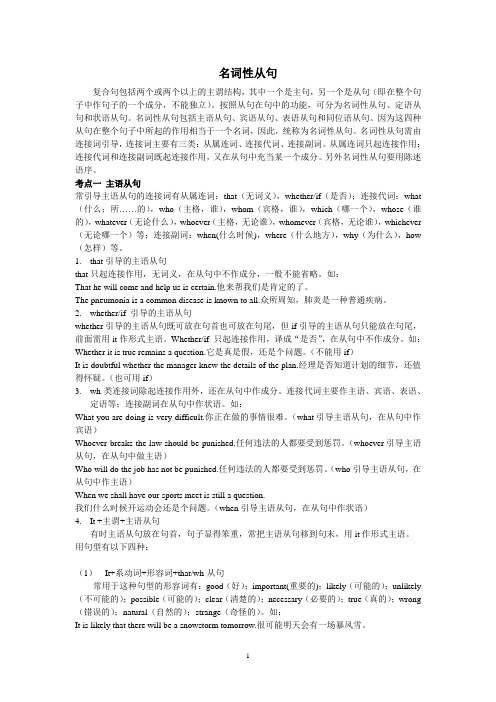
名词性从句复合句包括两个或两个以上的主谓结构,其中一个是主句,另一个是从句(即在整个句子中作句子的一个成分,不能独立)。
按照从句在句中的功能,可分为名词性从句、定语从句和状语从句。
名词性从句包括主语从句、宾语从句、表语从句和同位语从句。
因为这四种从句在整个句子中所起的作用相当于一个名词,因此,统称为名词性从句。
名词性从句需由连接词引导,连接词主要有三类:从属连词、连接代词、连接副词。
从属连词只起连接作用;连接代词和连接副词既起连接作用,又在从句中充当某一个成分。
另外名词性从句要用陈述语序。
考点一主语从句常引导主语从句的连接词有从属连词:that(无词义),whether/if(是否);连接代词:what (什么;所……的),who(主格,谁),whom(宾格,谁),which(哪一个),whose(谁的),whatever(无论什么),whoever(主格,无论谁),whomever(宾格,无论谁),whichever (无论哪一个)等;连接副词:when(什么时候),where(什么地方),why(为什么),how (怎样)等。
1.that引导的主语从句that只起连接作用,无词义,在从句中不作成分,一般不能省略。
如:That he will come and help us is certain.他来帮我们是肯定的了。
The pneumonia is a common disease is known to all.众所周知,肺炎是一种普通疾病。
2.whether/if 引导的主语从句whether引导的主语从句既可放在句首也可放在句尾,但if引导的主语从句只能放在句尾,前面需用it作形式主语。
Whether/if 只起连接作用,译成“是否”,在从句中不作成分。
如:Whether it is true remains a question.它是真是假,还是个问题。
(不能用if)It is doubtful whether the manager knew the details of the plan.经理是否知道计划的细节,还值得怀疑。
名词性从句讲义

强调:1)who和whom指人,what指物;
2)who和whom的区别是whom在从句中不能作主语。
作定语的有:whose,which,what,whichever,whatever
e.g. YBiblioteka u can choose whichever book you like.
If he will come is not known. (×)
2.if不能与or not直接连用。
e.g. if…or not (√) if or not (×)
whether…or not(√) whether or not (√)
四. “疑问词+ever”与“no matter+疑问词”的区别
强调,whose后不能加-ever。
2.连接副词连接副词在从句中作状语和表语。
when,where,why,how,whenever,wherever,however
e.g. That is why I am here.(作状语)
He decided to stay where he was.(作表语)
强调,why后不能加-ever。
3.特殊连接词
①that在句中不做任何成分,无意义,只起连接作用。
e.g. That he is not at home isn’t true.
②whether和if在从句中不作任何成分,但有意义“是否”。
e.g. I can’t decide whether I should go to her party.
I wonder where is he. (×)
基础突破第一关:名词性从句
一.分类及定义
英语:名词性从句讲义.doc
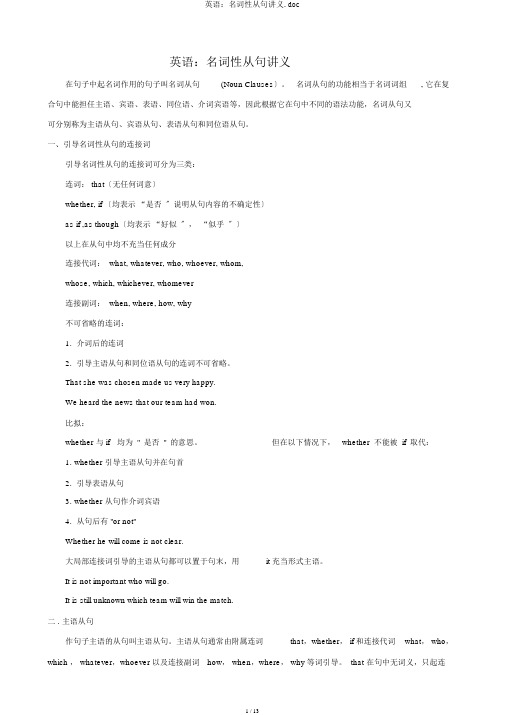
英语:名词性从句讲义在句子中起名词作用的句子叫名词从句(Noun Clauses〕。
名词从句的功能相当于名词词组, 它在复合句中能担任主语、宾语、表语、同位语、介词宾语等,因此根据它在句中不同的语法功能,名词从句又可分别称为主语从句、宾语从句、表语从句和同位语从句。
一、引导名词性从句的连接词引导名词性从句的连接词可分为三类:连词: that〔无任何词意〕whether, if 〔均表示“是否〞说明从句内容的不确定性〕as if ,as though〔均表示“好似〞,“似乎〞〕以上在从句中均不充当任何成分连接代词: what, whatever, who, whoever, whom,whose, which, whichever, whomever连接副词: when, where, how, why不可省略的连词:1.介词后的连词2.引导主语从句和同位语从句的连词不可省略。
That she was chosen made us very happy.We heard the news that our team had won.比拟:whether 与 if均为"是否"的意思。
但在以下情况下,whether 不能被 if 取代:1.whether 引导主语从句并在句首2.引导表语从句3.whether 从句作介词宾语4.从句后有 "or not"Whether he will come is not clear.大局部连接词引导的主语从句都可以置于句末,用it 充当形式主语。
It is not important who will go.It is still unknown which team will win the match.二 . 主语从句作句子主语的从句叫主语从句。
主语从句通常由附属连词that,whether, if 和连接代词what, who,which , whatever,whoever 以及连接副词how, when,where, why 等词引导。
名词性从句讲义

名词性从句学案一、定义:在复合句中相当于一个名词,做主语、宾语、表语、同位语的从句。
二、引导词:1. 连词: that , if, whether, as if2. 连接代词: who , what, which, whose, whom以及wh+ever3. 连接副词: when, where, why, because, how三、引导词的作用:1. 连词只有连接的功能,而不在从句中充当句子成分。
2. 连接代词和连接副词不但有连接的功能,同时还要在从句中充当特定的句子成分,主语、宾语、表语、定语、状语。
主语从句基本概念1.定义:在复合句中作句子主语的从句叫做主语从句。
2.构成:关联词+简单句3.引导主语从句的关联词有三类:连词that、whether;疑问代词who, what, which;疑问副词when, where, how, why⑴连词that(无词意), whether(是否), 在从句中不充当句子成分,只起连接作用; whether能引导主语从句,而if不能。
That you don’t like him has nothing to do with me.Whether John will do this experiment remains a question.⑵连接代词who, what, which, 在从句中既作连接词又充当主语、宾语、表语、定语等。
Who will be sent abroad to further his studies is not announced.What surprised me most was that such a little girl could play the violin so well.Which school will win the prize is not known.Whose dictionary has not been found is still unknown.Whichever you take will be yours.Whoever wants this book may take it.Whatever was said here must be kept secret.⑶疑问副词when, where, how, why在从句中充当时间状语、地点状语、方式状语、原因状语When they will start hasn’t been decided yet.Where the heroine went is not mentioned at the end of the story.How he managed to finish the composition in such a short time is still a mystery.Why he often comes here is known to us all.难点1.主语从句能用it作形式上的主语,而把真正的主语放在后面。
- 1、下载文档前请自行甄别文档内容的完整性,平台不提供额外的编辑、内容补充、找答案等附加服务。
- 2、"仅部分预览"的文档,不可在线预览部分如存在完整性等问题,可反馈申请退款(可完整预览的文档不适用该条件!)。
- 3、如文档侵犯您的权益,请联系客服反馈,我们会尽快为您处理(人工客服工作时间:9:00-18:30)。
名词性从句讲义8.19【考纲解读】1.了解名词性从句的基本用法;2.熟练掌握名词性从句的引导词及引导词在从句中的作用;3.what与that的区别;whether与if的区别;4. it作形式主语和形式宾语;5. that引导同位语从句与定语从句的区别。
【考题导引】1.(2016·北京,29)The most pleasant thing of the rainy season is ____ one can be entirely free from dust.A.whatB.thatC.whetherD.why解析:考查表语从句。
句意为:雨季最令人愉快的事情是人可以完全不受灰尘的袭扰。
分析句子结构可知,is 后的表语从句中不缺少成分,且句意完整,故选B。
2.The manager put forward a suggestion ___ we should have an assistant.There is too much work to do.(2016·天津,11)A.whetherB.thatC.whichD.what解析:考查同位语从句。
句意为:经理提了个建议——我们应雇个助手。
要做的工作太多了。
分析句子结构可知,空格后的同位语从句用来解释说明suggestion的具体内容,从句中不缺成分且意义完整,故选B项。
3.We must find out ___ Karl is coming,so we can book a room for him.(2015·重庆,8)A.whenB.howC.whereD.why解析:考查宾语从句。
句意为:我们一定要搞清楚Karl什么时候来,以便我们给他订房间。
由句意可知,要给Karl订房间,那么就要清楚他来这里的时间,故选when。
4.Your support is important to our work.___ you can do helps.(2016·北京,24)A.HoweverB.WhoeverC.WhateverD.Wherever解析:考查主语从句。
句意为:你们的支持对我们的工作很重要,无论你们做什么都会有帮助。
从句动词do 需要宾语,且引导主语从句,故用whatever,表示“无论什么”。
5. _______ we understand things has a lot to do with what we feel.(2015·北京,35)A.WhereB.HowC.WhyD.When解析考查主语从句。
句意为:我们怎样理解事物与我们所感觉到的东西有很大关系。
分析句子结构可知“________ we understand things”为主语从句,结合句意可知选B。
【知识梳理】名词性从句指的是在主句中起的作用相当于名词的从句,主要包括主语从句、宾语从句、表语从句和同位语从句。
一、主语从句1.引导主语从句的连接词:从属连词that, whether/if;连接代词what, who, whom, whose, whatever, whichever, whoever等;连接副词when, where, why, how, whenever等。
①That they were in truth sisters wa s clear from the facial similarity between them.从她们的面貌相似度就能清楚地看出她们真是亲姐妹。
②What struck me most in the movie was the father’s deep love for his son.影片中最打动我的是父亲对他儿子深深的爱。
2.主语从句一般放在句首,但有时也可用it作形式主语,而将主语从句移到句子的末尾。
常见的句型:(1)It+be+形容词(necessary/likely/important/uncertain等)+that从句(2)It+be+名词(短语)(a pity/a shame/no wonder/no surprise等)+that从句(3)It+be+过去分词(said/reported/decided/believed等)+that从句(4)It+不及物动词(seem, appear, happen等)+that从句①It is uncertain what side effect the medicine will bring about, although about two thousand patients have taken it.尽管大约两千名患者已经服用了这种药,但是它会带来什么样的副作用还不清楚。
②It’s no surprise that our team has won the game.我们队获胜一点都不令人吃惊。
③It is decided that the meeting will be put off till next Monday.会议被推迟到下周一召开已经定下来了。
二、宾语从句1.引导宾语从句的连接词:从属连词that, whether, if ;连接代词what, who, whose, whatever, whichever, whoever等;连接副词when, where, why, how 等;从句用陈述语序。
①We promise whoever attends the party a chance to have a photo taken with the movie star.我们许诺,任何参加这个聚会的人都有跟那个电影明星合影的机会。
②I truly believe that beauty comes from within.(2015·北京高考单选)我确信美来自内在。
③We must find out when Karl is coming, so we can book a room for him.(2015·重庆高考单选)我们必须弄清楚卡尔什么时候来,以便我们可以为他预订房间。
2.it 作形式宾语的宾语从句(1)一些动词后的宾语从句有宾语补足语时,则需要用it 作形式宾语,而将that 引导的宾语从句后置。
常见的这类动词有:find, feel, think, consider, believe, guess, suppose, make 等。
He has made it clear that the meeting will not be postponed.他清楚地表明会议不会被推迟。
(2)动词hate, like, dislike, appreciate, enjoy 等表示“喜欢”、“厌恶”的动词以及一些动词短语see to, depend on, rely on 等常用it 作形式宾语,而将宾语从句后置。
I would appreciate it if you could take my application into consideration.I shall see to it that he is taken good care of when you are absent.你不在的时候,我会确保把他照顾好。
三、表语从句1.引导表语从句的连接词:从属连词that, whether ;连接代词what, who, whose, whatever, whichever, whoever等;连接副词when, where, why, how 等;从句用陈述语序。
①Jerry did not regret giving the comment but felt that he could have expressed it differently.杰里不后悔给出评论,但是觉得自己本来可以用不同的方法来表达的。
②I’d like to start my own business — that’s what I’d do if I had the money.我愿意自己创业——那就是如果我有钱将会做的事情。
2.as if/as though 引导的表语从句as if/as though 引导的表语从句常跟在be 动词,seem, look, taste, sound, feel, appear 等动词之后。
The thick smog covered the whole city. It was as if a great black blanket had been thrown over it.浓雾覆盖着整座城市。
好像把一个巨大的黑色的毯子扔到它的上面。
3.because, why 引导的表语从句because, why 也可引导表语从句,但because 引导的表语从句,主语不能是reason 或cause (该结构常用that引导)。
常用于以下句型:⎩⎪⎨⎪⎧ This/That is/was why ... 这/那是……的原因。
This/That is/was because ... 这/那是因为……The reason why ... is/was that ... ……的原因是……①China is developing fast. That’s why I think those of my colleagues who deal with China affairs should visit China.中国在飞速发展,这就是我为什么认为我的那些跟中国打交道的同事应该访问中国。
②The reason w hy he didn’t pass the exam was that he was too careless.他没有通过考试的原因是他太粗心了。
四、同位语从句同位语从句在句中作某一名词的同位语,位于该名词之后,用以说明该名词的具体内容。
advice 建议 conclusion 结论 demand 要求 doubt 怀疑 fact 事实 hope 希望idea 主意 information 信息 message 消息 news 消息 order 命令 possibility 可能性 promise 诺言 我对自己承诺:今年,我高中的第一年,会有所不同。
②—Is there any possibility that you could pick me up at the airport?—No problem. ( ——你有可能到机场接我吗?——没问题。
)2.引导同位语从句的连接词有:that, whether, how, where, when, why 等。
